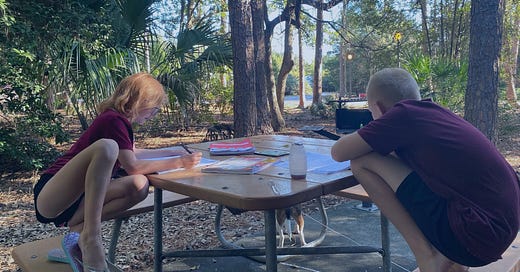Educate & Explore With Roadschooling
Have you heard of roadschooling? It is essentially homeschooling on the move, where travel becomes an integral part of the learning experience. Imagine using national parks, museums, zoos, and other destinations as your child's classroom. Just like traditional homeschooling, roadschooling can follow various approaches, from structured, curriculum-based methods to the more relaxed, interest-driven style of unschooling.
Traditional Approach
For those who prefer a more structured setup, roadschooling can follow a traditional "school-at-home" model using a pre-built curriculum. Examples include online programs like Time4Learning and IXL. Another option is BookShark, a literature-based program that primarily uses written materials which we really love.
Unschooling Approach
Alternatively, roadschooling can take an unschooling approach. Here, children learn based on their interests in a more unstructured way. Learning is driven by the places you visit, with no formal tests, allowing children to explore and discover at their own pace. One of the best aspects of unschooling is that it allows children to learn by doing which is conducive to the roadschooling lifestyle. For example, during our travels, we have visited the Wright Brothers National Memorial for history, explored Fort Sumter where my kids started participating in the junior ranger program, and hiked to a waterfall in the Smoky Mountains as part of their physical education. These hands-on experiences help children better understand and retain the information they read about in books.
Unit Studies
I also love unit studies, where we focus on a particular topic in depth. This method allows us to immerse ourselves in a subject, exploring it from multiple angles and through various hands-on activities. The Waldock Way offers excellent resources for unit studies that make learning both fun and engaging. We have used her pre-planned unit studies on Visiting the National Parks and Exploring the U.S which were perfect during our travels.
Eclectic Approach
Many families choose an eclectic approach, combining all of the different learning methods from above, this is what we do in our “roadschooling”.
Currently, I'm preparing my Individualized Home Instruction Plan (IHIP) for the upcoming homeschool year, as required by New York State. Here's a sneak peek at our plan:
Math and Language Arts: We’ll be using IXL.
Writing: The kids will keep journals of our travels.
Science: We'll conduct unit studies on space, with visits to the Houston Space Center and Kennedy Space Center. We'll also learn about plants, animals, and ecosystems through the National Park System, zoos, and aquariums. Earth science studies will include visiting land structures by visiting the Grand Canyon and caves.
Social Studies: We'll explore significant historical sites such as the Alamo and Gettysburg.
The beauty of roadschooling is that it makes learning tangible. Visiting locations throughout the country not only makes the information come alive but also significantly enhances retention.
Recommended Reading
Free to Learn by Peter Gray
This book talks about the advantages of unschooling and the power of play in a child’s education. Peter Gray explores how children learn best when they are free to explore their interests and passions without the constraints of traditional schooling.
Let Them Be Kids by Jessica Smartt
Jessica Smartt's book is an excellent resource that emphasizes the importance of letting children be children. It provides practical advice on how to foster a love for learning through play and exploration.
Both of these books offer valuable insights into creating a more relaxed and interest-driven learning environment, perfect for those considering or currently practicing the unschooling approach.
If you're considering roadschooling or are already a roadschooling family, I’d love to hear about your experiences and what has worked for you!




